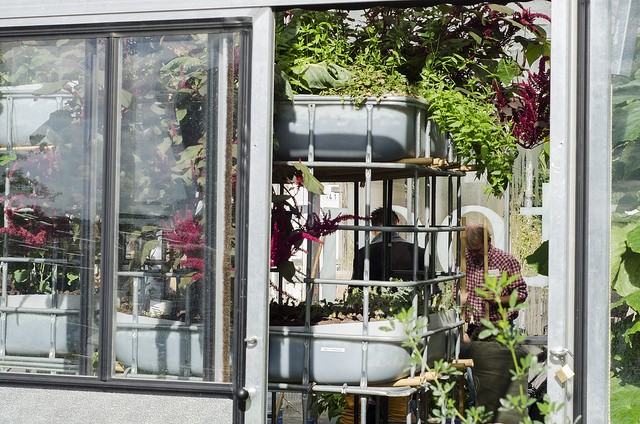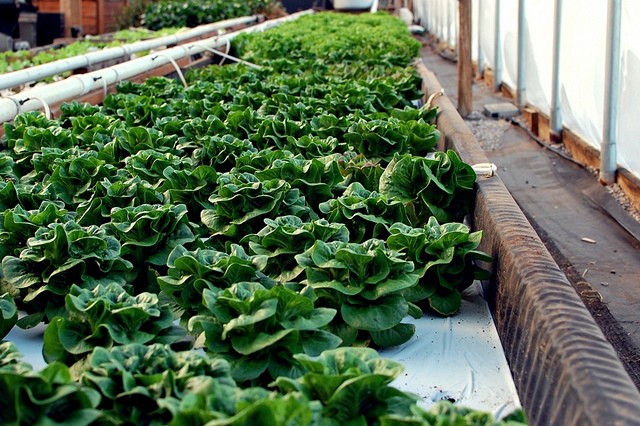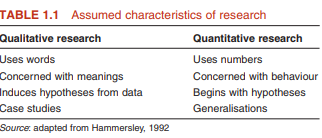If you?re interested in the subject of indoor farming, there?s a good chance you?ve heard about aquaponics. This combination of aquaculture and hydroponics has attracted significant attention from casual indoor farming enthusiasts, industry experts, and everyone in between.
That doesn?t mean everyone interested in the field understands exactly what aquaponics is or how it works. Thus, it?s valuable to spend some time reviewing what it is and why it?s beneficial.
Aquaponics Defined
Aquaculture involves the farming of fish and other aquatic organisms. This process produces a relatively large portion of the fish humans consume. However, it isn?t without its difficulties. A key one is the pollution of the environment in which fish and other creatures are farmed.
 Image by FotoMediamatic | Flickr
Image by FotoMediamatic | Flickr
Fish naturally create waste during their life-cycles. If this waste accumulates in a contained environment (such as those used in aquaculture), it can cause harm. Aquaculture operations must be vigilant about keeping the water safe for the fish growing in it.
Aquaponics represents a solution. The waste may be harmful to fish, but it?s beneficial to various forms of plant life in the form of fertilizer. In an aquaponic system, animal waste provides plants with nutrition. The plants, in turn, purify the water by absorbing and using the waste. The result is a symbiotic relationship in which both fish and plant life support each other.
Aquaponics Conserves Resources
It?s easy to see the advantages aquaponic systems offer. Conserving resources is a major one. Aquaponics allows indoor farmers to grow both fish and plant life without having to use added fertilizer to support plant growth. The fish provide the necessary fertilizer. From a business perspective, this helps aquaculture operations reduce expenses.
Conserving resources also helps aquaculture businesses appeal to consumers. Surveys indicate younger people are more willing to patronize businesses with socially-conscious values. Adopting a growing system requiring less fertilizer is a smart way for a business to meet the expectations of such customers.
In addition to using less fertilizer, aquaponic systems require considerably less water than traditional indoor agriculture methods. This is yet another way aquaponics helps indoor farming operations save money and save the planet.
Aquaponics Is Organic
Using natural fertilizer from fish waste also helps indoor farmers appeal to customers who prefer to consume organic vegetables. Because the plants and fish share an environment, it?s not possible or necessary to use many common types of agrochemicals (such as pesticides) that often play major roles in agriculture.
 Image by Megan | Flickr
Image by Megan | Flickr
Such chemicals could harm the fish within the system. Thus, aquaponics represents an organic approach to growing vegetables and other types of plant life. This is something that is important to many consumers.
There?s also reason to believe aquaponics boosts the efficiency of the plant-growing process. The nutritious benefits of fish waste result in faster growing speeds for many plants. On top of that, aquaponic systems allow for the growth of substantial crops in relatively small spaces. This further boosts the efficiency of these businesses.
Aquaponics Keeps Agriculture Local
Aquaponic systems also help plant growers overcome limitations that regional factors might otherwise impose on them. Not all climates and locations are suitable for traditional approaches to agriculture. Colder regions may not allow farmers to grow crops in open fields. Urban locations may not provide the space for large crop fields. Certain arid regions may be too dry to support thriving plant life.
That?s not a problem with an aquaponic approach. Because these systems are typically contained and enclosed, they can be erected and maintained in virtually any environment. This allows farmers in remote locations to grow crops they could not otherwise produce.
This adds yet another item to the list of environmental benefits aquaponic systems offer. When farmers can grow a wider variety of crops in areas where doing so was once impossible, businesses no longer need to ship those crops to those regions. Consumers can instead purchase them from local farmers. By reducing the need to ship certain crops across wide distances, aquaponics reduces the amount of resources used in getting crops from the farm to the customer.
That may also be good for consumers from a purely financial perspective. When it takes less time and resources to ship a crop, businesses can charge less for those crops. The fact that aquaponic systems also yield healthy fish means they have the power to offer consumers affordable vegetables and seafood while limiting their environmental impact.
The Future of Aquaponics
These are merely a few of the reasons why indoor farming experts and enthusiasts have focused their attention on this topic. The development of effective aquaponic systems has the potential to dramatically transform not only indoor farming, but agriculture and aquaculture in general. It also helps conserve major resources. The more we recognize the importance of conservation, the more we?ll realize how useful aquaponics can be.


